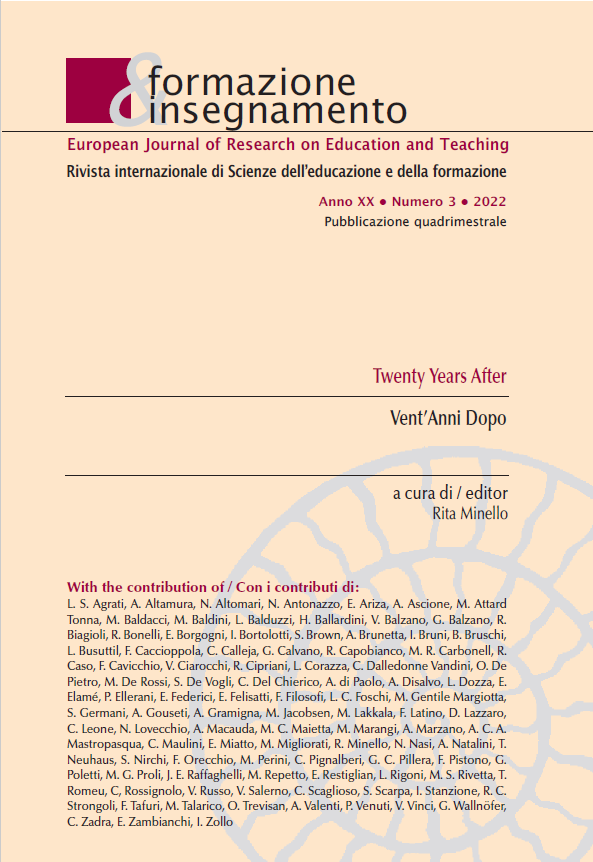Ecological Talent: A Perspective for the Places Ecosystem and Transition
DOI:
https://doi.org/10.7346/-fei-XX-03-22_03Keywords:
Ecological talent, Ecosystem theory, Nature rights, Capability approach, Spatial contractsAbstract
The paradigm shift prospect is increasingly accompanied by the transition theme, which would require an equally sweeping direction change from several points of view. On the one hand, with the National Recovery and Resilience Plan is intended to implement a program in this sense; on the other, it should be noted that, for decades, the paradigm shift has been supported by research as non-postponable. A possible new paradigm should identify a convergence of the immaterial perspective, first of all, the ecological and ecosystem culture and the rights of the nation of plants; at the same time, the education of ecological talent could guide the terrestrial places life, in the forms of mutual support, in the Capability Approach and the Spatial contract horizon. The ecological paradigm emerges in this direction, already described by Capra and Bateson. Consequently, the material convergence, technological and economic, should interpret the ecosystem purpose rather than the radical modification of existence with the mercantilist drifts of the transition itself.
References
Acatech National Academy of Science and Engineering (2013). Recommendations for implementing the strategic initiative INDUSTRIE 4.0. Frankfurt am Main: Acatech.
ASVIS (2022). Rapporto 2022: L’Italia e gli Obiettivi di Sviluppo Sostenibile. Roma: ASVIS.
Baldacci, M. (2017). Oltre la subalternità. Praxis e educazione in Gramsci. Roma: Carocci.
Baricco, A. (2108). The Game. Einaudi: Torino.
Bateson, G. (1997). Una sacra unità. Milano: Adelphi.
Bateson, G. (1984) Mente e natura, un’unità necessaria. Milano: Adelphi.
Bateson, G. (1972). Verso un’ecologia della mente. Milano: Adelphi.
Bentivogli, M., & Pirone, D. (2019). Fabbrica Futuro. Milano: Egea.
Bertin, G. M. (1983). Costruire l’esistenza. Roma: Armando.
Brofenbrenner, U. (1986). Ecologia dello sviluppo umano. Bologna: Il Mulino.
Capra, F. (1997). La rete della vita. Perché l’altruismo è alla base dell’evoluzione. Milano: Rizzoli.
Carducci, M. (2017). Natura (diritti della). In R. Sacco (Ed.), DIGESTO delle Discipline Pubblicistiche (4th Ed.) (pp. 486–520). Torino: Utet Giuridica.
DeVita, A. (2017). Senso del lavoro nelle economie diverse. Uno studio interdisciplinare. Milano: FrancoAngeli.
Dozza, L. (2019). Maestra Natura. Per una pedagogia esperienziale e co-partecipata. Bergamo: ZeroseiUp.
Federighi, P. (Ed.) (2018). Educazione in Età Adulta. Firenze: Firenze University Press.
Governo Italiano. (2021). Piano Nazionale di Ripresa e Resilienza. #nextgenerationitalia. Retrieved September 30, 2022, from https://www.governo.it/sites/governo.it/files/PNRR.pdf
Lincoln, R., Boxshall, G., & Clark, P. (1982). A Dictionary of Ecology, Evolution and Systematics. Cambridge, Cambridge University Press.
Malavasi, P., Iavarone, M., Orefice, P., & Pinto Minerva, P. (Eds.). (2017). Pedagogia dell’ambiente 2017. Tra sviluppo umano e responsabilità sociale. Lecce: PensaMultimedia.
Mancuso, S. (2018). La Nazione delle Piante. Bari-Roma: Editori Laterza.
Margiotta, U. (2018). La formazione dei talenti. Milano: FrancoAngeli.
Margiotta, U. (2015). Teoria della formazione. Ricostruire la pedagogia. Roma: Carocci.
Maturana, H., Varela, F.J. (1987). L’albero della conosenza. Milano: Garzanti.
Meadows, D. H., Meadows, D.L., Randers, J., & Behrens, W. W. (1972). The limits of Growth. New York: Universe Books.
Morin, E. (2007). L’anno I dell’era Ecologica. Roma: Armando.
Nussbaum, M. C. (2012). Creare capacità. Liberarsi dalla dittatura del PIL. Bologna: Il Mulino.
Nussbaum, M. (2011). Non per profitto. Bologna: Il Mulino.
Francesco, Santo Padre. (2015). Laudato si’: Sulla la Cura della Casa Comune. Roma: Libreria Editrice Vaticana. Retrieved September 30, 2022, from https://www.vatican.va/content/francesco/it/encyclicals/documents/papa-francesco_20150524_enciclica-laudato-si.html
Pinto Minerva, F. (2013). Prospettive di ecopedagogia. A scuola dalla Natura. In M. Iavarone, P. Malavasi, P. Orefice, & F. Pinto Minerva (Eds.), Pedagogia dell’ambiente 2017. Tra sviluppo umano e responsabilità sociale (pp. 173–191). Lecce: PensaMultimedia.
Scandurra, E. (2022). La svolta ecologica. Ultima chance per il pianeta. Roma: DeriveApprodi.
Scandurra, E., Agostini, I., & Attili, G. (2020). Biosfera L’ambiente che abitiamo. Roma: DeriveApprodi.
Schenetti, M., & D’Ugo, R. (2022). Didattica, Natura, Apprendimenti. DNA, strumento di valutazione per la qualità dell’educazione all’aperto. Milano: FrancoAngeli.
Schafran, A., Noah Smith, M., & Hall, S. (2020). The spatial contract A new politics of provision for an urbanized planet. Manchester: Manchester University Press.
Scharmer, O., & Kaufer, K. (2015). Leadership in un futuro che emerge. Da ego-sistema a eco-sistema: nuove economie e nuove società. Milano: FrancoAngeli.
Sen, A. (2003). Development as Capability Expansion. In S. Fukuda-Parr (Ed.) Readings in Human Development. New Delhi and New York: Oxford University Press.
Sen, A. (2000). Lo sviluppo è libertà. Perché non c’è crescita senza democrazia. Mondadori: Milano.
Tansley, A. G. (1935). The use and abuse of vegetational concepts and terms. Ecology, 16(3), 284–307. https://doi.org/10.2307/1930070
Vogel, J., Steinberger, J. K., O’Neill, D. W., Lamb, W. F., & Krishnakumar, J. (2021). Socio-economic conditions for satisfying human needs at low energy use: An international analysis of social provisioning. Global Environmental Change, 69, 102–287. https://doi.org/10.1016/j.gloenvcha.2021.102287
World Commission on Environment and Development (1987). Our Common Future, From One Earth to One World. A/42/427. WCED: Ginevra. Retrieved September 30, 2022, from http://www.un-documents.net/ocf-ov.htm
Downloads
Published
How to Cite
Issue
Section
License
Copyright (c) 2022 Piergiuseppe Ellerani

This work is licensed under a Creative Commons Attribution 4.0 International License.
Formazione & insegnamento is distributed under Attribution 4.0 International (CC BY 4.0).
For further details, please refer to our Repository & Archiving Policy, as well as our Copyright & Licensing Terms.





